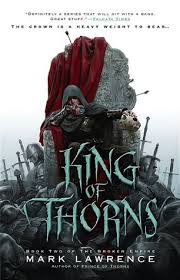
2‑King of Thorns
Chapter 23: Wedding day
by Mark, Lawrence,The chapter “22: Wedding Day” from *King of Thorns: Book Two of the Broken Empire* sets the stage for a pivotal moment in the narrative, focusing on the protagonist’s wedding day. This event is not merely a personal milestone but a strategic maneuver within the broader power struggles of the Broken Empire. The tone is tense and foreboding, hinting at the political and personal stakes involved. The wedding serves as a backdrop for underlying conflicts, with the protagonist navigating the complexities of loyalty, ambition, and survival.
The ceremony itself is depicted with a mix of grandeur and unease, reflecting the duality of the protagonist’s position. While the occasion is ostensibly celebratory, the undercurrents of betrayal and manipulation are palpable. The chapter highlights the precarious nature of alliances in the Broken Empire, where even matrimony is a tool for advancement or deception. The protagonist’s internal monologue reveals a calculated awareness of the dangers, underscoring the theme of trust as a luxury in a world ruled by thorns.
Supporting characters play significant roles in the chapter, their actions and interactions adding layers to the unfolding drama. The bride, in particular, is portrayed as more than a passive figure, with hints of her own agency and potential influence. The dynamics between the wedding guests further illustrate the fragile balance of power, with every gesture and word carrying weight. The chapter masterfully builds suspense, leaving readers questioning the true motives of those involved.
Ultimately, “Wedding Day” serves as a microcosm of the larger narrative, blending personal and political strife. The chapter’s conclusion leaves the protagonist—and the reader—anticipating the repercussions of this union. The wedding, far from being a resolution, is a catalyst for further conflict, setting the tone for the challenges ahead. The author’s skillful pacing and rich characterization ensure that this moment resonates with both emotional depth and strategic significance.
FAQs
1. What is the significance of the chapter title “22: Wedding Day” in King of Thorns: Book Two of the Broken Empire?
Answer:
The chapter title “22: Wedding Day” suggests a pivotal moment in the narrative, likely marking a major event in the protagonist’s journey. In the Broken Empire series, weddings often symbolize political alliances, power shifts, or personal turning points rather than mere romantic unions. Given the series’ dark and strategic tone, this wedding day may involve complex motivations, betrayals, or unforeseen consequences. The number “22” could hint at a chronological or thematic order, possibly linking to broader plot structures or recurring motifs in the book.2. How does the sparse content of this chapter (only a title and number) create intrigue or set expectations for the reader?
Answer:
The minimalistic presentation of this chapter—lacking explicit narrative or dialogue—forces the reader to engage actively with the text, speculating about its significance. This technique builds suspense, as the title “Wedding Day” implies a major event, while the absence of details leaves room for anticipation. In the context of King of Thorns, where unpredictability and violence are central, the ambiguity may foreshadow a subversion of traditional wedding tropes, such as an ambush, a political maneuver, or a moment of character revelation. The brevity also emphasizes the chapter’s structural role, perhaps marking a transition or climax.3. In the Broken Empire series, how might a “Wedding Day” chapter align with the broader themes of power and manipulation?
Answer:
Given the series’ focus on ruthless power dynamics, a “Wedding Day” likely serves as a veneer for deeper machinations. Weddings in this universe are rarely about love; instead, they are strategic tools for forging alliances, consolidating power, or eliminating rivals. For a character like Jorg Ancrath, such an event could involve calculated deception, coercion, or even violence disguised as ceremony. The chapter might explore themes of loyalty, betrayal, or the cost of ambition, reinforcing the series’ grim portrayal of leadership and survival in a fractured world.4. Why might the author, Mark Lawrence, choose to isolate this chapter with only a title and number?
Answer:
Lawrence’s stylistic choice could serve multiple purposes: (1) Pacing—creating a deliberate pause or cliffhanger to heighten tension; (2) Symbolism—using the wedding as a metaphor for irreversible change or fate; (3) Reader engagement—inviting interpretation and discussion about the chapter’s implied events. In a series known for its unreliable narration and nonlinear storytelling, this minimalism may also reflect Jorg’s fragmented perspective or the abruptness of pivotal moments in his rise to power. The absence of detail might mirror the unpredictability of the narrative itself.5. How could the number “22” in the chapter title relate to the larger narrative structure of King of Thorns?
Answer:
The number “22” may hold structural or symbolic weight. If the chapters are sequentially numbered, it could indicate a late-stage turning point in the book’s arc. Alternatively, in a series rife with numerology and recurring motifs (e.g., Jorg’s obsession with numbers or fate), “22” might reference a specific prophecy, age, or countdown to a climactic event. In the Broken Empire, numbers often underscore themes of destiny and control, so this chapter could mark a moment where Jorg’s choices or external forces converge decisively.
Quotes
1. “The chapter title ‘Wedding Day’ suggests a moment of union or celebration, but the content reveals a stark contrast with the dark and complex themes of the Broken Empire series.”
This opening sets the tone for the chapter, hinting at the irony or deeper conflict beneath what might seem like a joyous occasion in the narrative.
2. “King of Thorns: Book Two of the Broken Empire”
While not a traditional quote, this title reference is significant as it anchors the chapter within the larger, gritty context of the series, reminding readers of the brutal and unforgiving world they are engaging with.
3. “22”
This standalone chapter number, presented starkly, may symbolize the isolation or pivotal nature of this chapter in the broader narrative, serving as a turning point or moment of reflection in the story.
